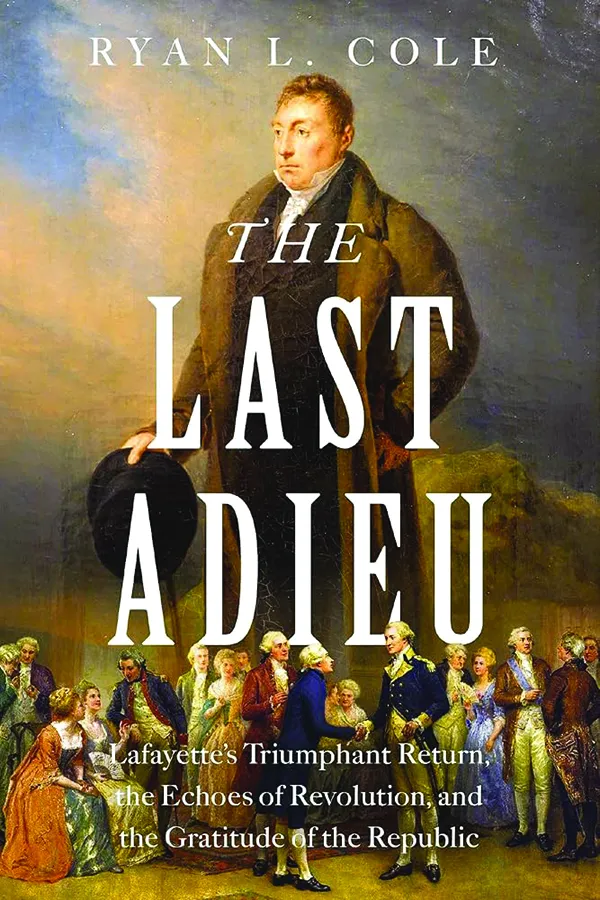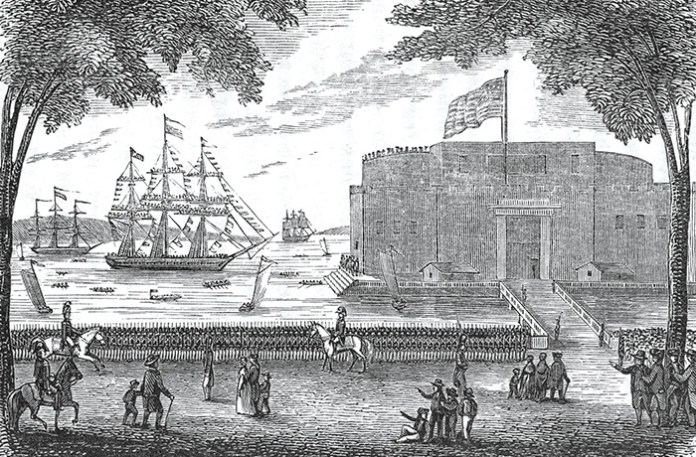On Aug. 15, 1824, as the summer sun sank over New York Harbor, a huge crowd pressed against the wharves, straining for a glimpse of the Cadmus. Church bells rang out as the ship eased into view, and on its deck stood the figure they had all come to see: Gilbert du Motier, Marquis de Lafayette. At 67, 40 years after leaving America for France, the hero of the Revolution returned not as a soldier, but as the honored guest of the nation he had helped to secure.
Lafayette’s landing marked the start of a remarkable journey unlike any in American history, and Ryan Cole’s The Last Adieu: Lafayette’s Triumphant Return, the Echoes of Revolution, and the Gratitude of the Republic captures the fervor it unleashed across the growing United States. For 13 months, Lafayette traveled to all 24 states of the young republic, met with delirious crowds, endured endless pageants and speeches, and accepted memorial dedications as the “Nation’s Guest.” Cole dutifully records these ceremonies, showing how Americans, still shaping their national adolescence, looked to Lafayette as both President George Washington’s adopted son and a living bridge between the Revolution’s sacrifice and the prosperity it had made possible.
Cole’s book is a snapshot of America during the Era of Good Feelings, a kind of interregnum between the first and second party systems in which James Monroe served as president. Throughout the book, The Last Adieu weaves in cultural and political signposts to help the reader understand what’s happening in the U.S. as the children of the American Revolution prepare to take the lead over the country their parents had left them. Lafayette and his tour served as the perfect vehicle for the handoff.
The invitation to return to America four decades later, issued by President James Monroe and sanctioned by Congress, was more than a courtesy. It was an act of remembering and a conscious effort to bind a fading revolutionary generation to its heirs before the final link to independence was gone. As Cole shows, Lafayette belonged to everyone, and he bore that burden willingly and happily, giving his attention not just to political leaders and generals but to innkeepers, children, and the everyday citizens who pressed forward to meet their hero all over the country.

The sheer size of Lafayette’s tour was awe-inspiring, but it fit the magnitude of the man who experienced two of the most important revolutions in world history and nearly paid with his life during both. Cole writes, “Over five thousand miles, in carriages and steamboats, barges and packets, Lafayette had skirted the ocean, crossed a great river, wrecked on another, rode through forests and into the frontier, and sailed along the incredible canal, always caught in, as he called it, ‘a whirlwind of charity.’ The sixty-seven-year-old had obliged almost every invitation, shook thousands of hands, memorialized his dead brother soldiers, and made history by simply pausing for an hour in communities that would remember the visit centuries later. No public man had ever successfully attempted such an endeavor.”
The Last Adieu does well in sketching Lafayette’s life before his return, especially his profound devotion to his adoptive father, whose memory still defined him decades later. Cole also shows that Lafayette retained a gift for politics, and his instincts for what the republic required steadied the nation during one of its most difficult elections. He became, in effect, a living emblem of unity — refusing to take sides between John Quincy Adams, Andrew Jackson, Henry Clay, and William Crawford in the contentious election of 1824.
Throughout his tour, Lafayette encountered nearly all the candidates, yet his manner remained scrupulously cordial and above the fray. He accepted the role of unifier rather than partisan, content to let the nation’s political battles unfold without his intervention. That symbolism was nowhere clearer than in Washington, where Lafayette’s visit coincided with the House’s decision in the presidential election. After Adams’s victory, he saw a scene that seemed to vindicate the strength of American democracy: Andrew Jackson, the defeated rival, offered Adams a handshake at a White House dinner. It was no small matter that both men knew who was there watching.
REVIEW: THE RISE OF THE PINKERTONS
Lafayette’s tour also sparked a nostalgia for President Washington and the heroes of the American Revolution. At Mount Vernon, he knelt by his surrogate father’s tomb, rising with tears that his secretary Auguste Levasseur recorded and the press amplified. In Baltimore, Washington’s adopted grandson staged a poignant tableau by welcoming him inside the general’s old war tents, stirring more weeping — both from Lafayette and those watching in awe. In Philadelphia, Lafayette’s visit spurred the restoration of Independence Hall’s steeple and an impulse to preserve the relics of the Revolution. The Last Adieu shows how the tour transformed historical memory into acts of preservation.
As America approaches the 250th anniversary of its independence, there is a lesson in Lafayette’s long farewell. His tour turned nostalgia into something that went beyond fond memories. It served as a vehicle for national renewal, transforming the Revolution’s values into a symbol of unity and a shared inheritance. Everywhere he went, Lafayette was greeted with exuberant crowds who honored not just his past deeds but the principles he embodied, principles that Americans understood had shaped the nation for the better in 1824 and promised to continue doing so long into the future. The Last Adieu reminds us that the ideals Lafayette fought for still have the power to bind a divided nation, if we choose to let them.
Carl Paulus is a historian from Michigan and author of The Slaveholding Crisis: Fear of Insurrection and the Coming of the Civil War.
, 2025-10-10 03:35:00,  , Washington Examiner, %%https://www.washingtonexaminer.com/wp-content/uploads/2023/11/cropped-favicon.png?w=32, https://www.washingtonexaminer.com/feed/, Carl Paulus
, Washington Examiner, %%https://www.washingtonexaminer.com/wp-content/uploads/2023/11/cropped-favicon.png?w=32, https://www.washingtonexaminer.com/feed/, Carl Paulus
